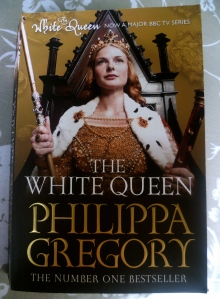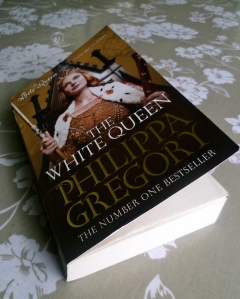Published: 2009, Simon & Schuster, paperback, 409 pages
Book 1 of ‘The Cousins’ Wars’ Series, historical fiction
Setting the scene
It is 1464 in a divided medieval England. Civil war rages between two rival houses, both with claim to the throne: York and Lancaster.
Three years after overthrowing the Lancastrian king, the Yorkist Edward IV still endeavours to establish his rule as rightful king against opposition from the rival house.
A not-so-chance meeting results in a surprising marriage between this York king and a Lancastrian widow, Elizabeth Woodville. The two are sent spiralling down a tumultuous path, a bloody path of unrest and betrayal with opposition escalating treacherously close to home.
Just how far can Elizabeth go to protect her family and their rise to power? Does a mother’s resolute ambition ultimately compromise the safety of her children?
Review
The novel is written in the first-person narrative of Elizabeth Woodville, the White Queen of the title. Typically victimised through history, Gregory ventured to do Elizabeth justice by acknowledging the strength and determination she upheld throughout the difficulties she faced, and she certainly faced her fair share.
We follow Elizabeth down a rollercoaster of a journey, from her humble beginnings to the testing and unstable life she leads as Queen consort to Edward IV. She encounters disloyalty, charges of witchcraft and bastardy, the execution of many close to her and the mysterious disappearance of her two princes in the Tower of London. All that barely scratches the surface of the challenges she faces.
It is easy to determine that Elizabeth is a strong and formidable female and for the large part she is a character we sympathise with. However, I nonetheless found her difficult to warm to, especially as we are introduced to her as a woman who deliberately uses her beauty to ensnare the king’s attention. Her ruthless ambition also becomes a little irksome towards the end of the novel and I was grateful for scenes where she is depicted spending time with her young children, as they make her a rounded character, not solely a power-hungry beauty.
Entwined within this novel of political dispute and military action is an unexpected subplot surrounding an ancient legend. The legend of the water-goddess Melusina, who is half-woman and half-serpent or fish, is recognisable nowadays through its retelling as the Little Mermaid. In the novel, Elizabeth’s mother, Jacquetta, believes that she descends from Melusina and we see her and Elizabeth performing enchantments throughout. The legend is a surprising and enjoyable element in the novel.
One of my favourite aspects of the novel is Gregory’s inclusion of a poem written by Anthony Woodville, Elizabeth’s beloved brother. I thought it was beautiful when I found out that it is the actual poem Anthony, in reality, wrote the night before his death. This is touching because Anthony is such a warm character and it also brings home the fact that this is based on real people and largely real events.
Overall
Would I recommend this book? Yes
★★★☆☆(3.5)
Gregory’s writing style is easy and informative though slightly too romanticised for my liking. She manages to keep the reader’s head above water in what could have been an all-too complex plot of political tug-of-war.
Gregory set out to bring history to life and she has succeeded in doing so.
TV series
BBC TV 10-part adaptation: BBC One, Sundays, 9pm
(First episode broadcast 16 June 2013, US: 10 August 2013)
The TV adaptation has been criticised for its historical implausibility; despite this, I am enjoying the series. The first episode is impressively faithful to the novel and I particularly like the casting of Max Irons – The Host (2013) – as Edward IV. Irons comes across as charming and amiable, just as Edward IV is in the novel and is recorded to have been in history.
The series is more romanticised than the novel, though this is often the case when trying to draw in viewership. I’m looking forward to seeing how the rest of it unfolds.
*


